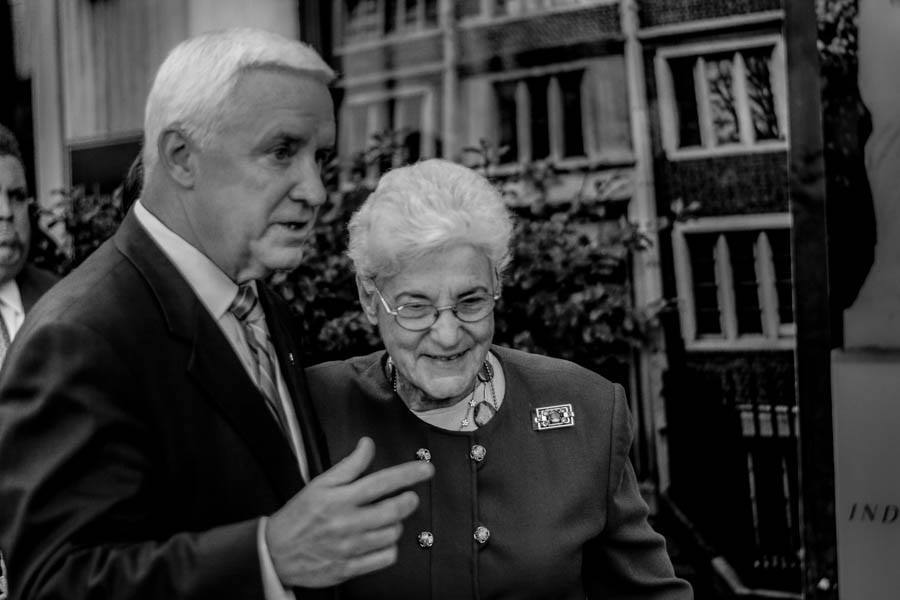
Former District Attorney and mayoral candidate Lynne Abraham with Governor Corbett at the Revictimization Relief Act signing in October 2014. Photo by Joshua ALbert
By Kenneth Lipp
A group of legal advocacy organizations, media outlets, academics, journalists, and former state inmates filed a federal lawsuit today against Pennsylvania Attorney General Kathleen Kane and Philadelphia District Attorney Seth Williams, in their official capacities, over the controversial Revictimization Relief Act. The suit, filed today in the US District Court for the Middle District of Pennsylvania, dubs the law which Corbett signed in October the “Silencing Act,” and asks the court to grant an injunction against its enforcement.
The lawsuit claims that the Revictimization Relief Act is “unconstitutional in at least four different ways.” The Plaintiffs say the law is unconstitutionally vague, that it unlawfully regulates speech based on content, that it is overly broad in its potential application, and that its enforcement would constitute an act of prior restraint, meaning that it censors expression before that expression actually occurs, which US courts have consistently ruled to be unconstitutional except in extreme cases related to national security.
Media and advocacy organizations who have joined the suit with four formerly incarcerated persons say the law threatens their access to information upon which they rely to publish work in the public interest, by potentially gagging the subjects of their writing. Journalists Daniel Denvir and Christopher Moraff both have long-term investigations under development which they say are in peril under the act, as they “would feature interviews with and comments from Pennsylvania inmates convicted of personal injury crimes.”
Seven of the eleven are third parties who rely on and publish speech by individuals convicted of personal injury crimes, in order to inform the public and spur government action regarding issues of public concern. Those issues include wrongful convictions, prison conditions, penal policy, juvenile life without parole, and clemency.
“The primary role of a journalist is to inform the public about what the government, including the courts and prisons, is doing in its name. Sometimes that makes people uncomfortable,” says Moraff, who writes about criminal justice locally and for nationwide outlets such as Al-Jazeera America. “By threatening to silence a critical source of information, this law not only threatens my ability to do my job, but to my mind undermines the very ideal of a free press.”
Professor Regina Austin of the University of Pennsylvania runs a program at the law school that supports clemency applications, and along with Moraff and Denvir as well as prisoner information and support organizations Solitary Watch and Prison Legal News fears that what their complaint calls the Silencing Act “will be used to enjoin or penalize their publication of offender speech and that the Act will chill offenders from speaking with them—whether through interviews, written submissions, or otherwise.”
Full text of the complaint below

It’s funny how this law was passed so quick just because Mumia Abdul-Jamal was asked to be commencement speaker by a college hardly anyone ever heard of. We have a lot more pressing problems, yet they go unaddressed.
LikeLike
[…] “The primary role of a journalist is to inform the public about what the government, including the courts and prisons, is doing in its name. Sometimes that makes people uncomfortable,” said Christopher Moraff, a criminal justice reporter named as a plaintiff, according to Kenneth Lipp at The Declaration. […]
LikeLike
[…] “The primary role of a journalist is to inform the public about what the government, including the courts and prisons, is doing in its name. Sometimes that makes people uncomfortable,” said Christopher Moraff, a criminal justice reporter named as a plaintiff, according to Kenneth Lipp at The Declaration. […]
LikeLike
[…] “The primary role of a journalist is to inform the public about what the government, including the courts and prisons, is doing in its name. Sometimes that makes people uncomfortable,” said Christopher Moraff, a criminal justice reporter named as a plaintiff, according to Kenneth Lipp at The Declaration. […]
LikeLike
[…] “The primary role of a journalist is to inform the public about what the government, including the courts and prisons, is doing in its name. Sometimes that makes people uncomfortable,” said Christopher Moraff, a criminal justice reporter named as a plaintiff, according to Kenneth Lipp at The Declaration. […]
LikeLike
[…] Prison Society, and Philadelphia-based journalists Daniel Denvir, Christopher Moraff, among others, are seeking an injunction based on their belief that the RRA will endanger the free speech rights of prisoners because it […]
LikeLike
[…] signed into law by a Parthian Governor Corbett last year, and dubbed “The Silencing Act” by the plaintiffs who filed suit to nullify it. The law was designed to allow victims to take judicial action against convicted persons whose […]
LikeLike